Saving Spring Mountain Ranch
A baroness, a billionaire, an enchanted escape, and the preservationists who put you on the invitation list.
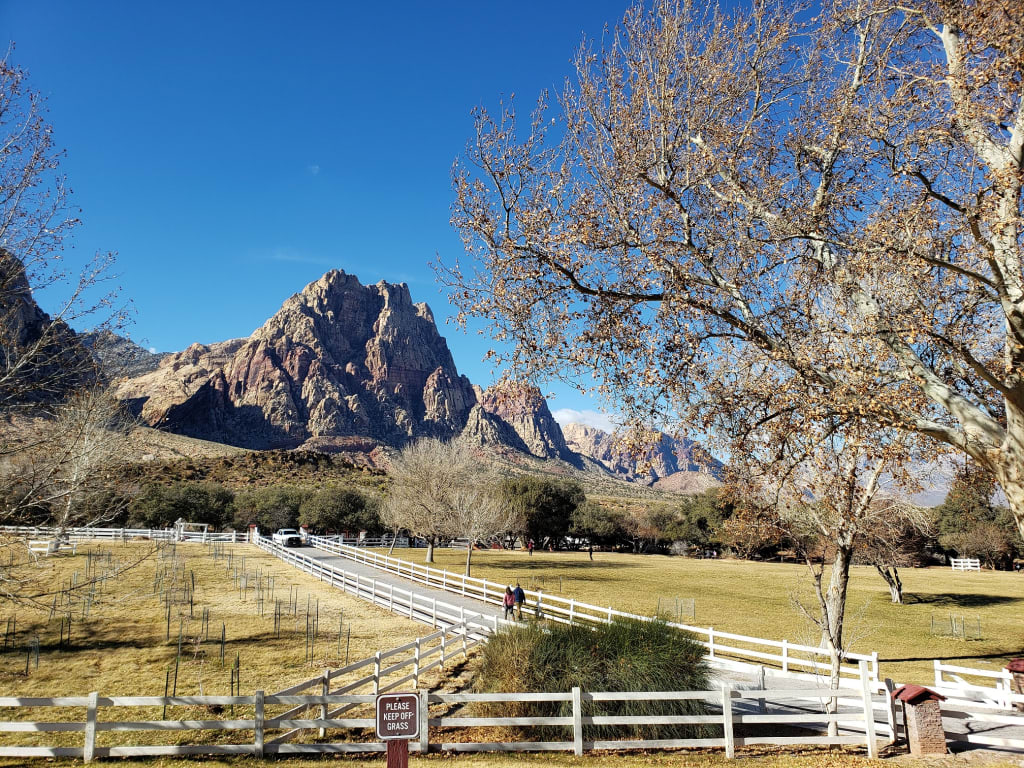
"Jon, it's time to get up. Let's get a move on."
My mother always loved the sunrise. I sat up in bed. It was a cool, spring morning, in Goodsprings, Nevada, 1974. I was about to turn 10. A little heat was coming from the wood burning stove outside my bedroom door.
I searched for first light out the window, but it was too early for the sun. rushing to get dressed and ready, I joined my mother for coffee with lots of sugar and milk, and climbed into her lifted Ford Bronco. She pulled away from the house and headed north, straight onto a dirt road, into the desert.
Often on archaeological digs with my parents, I was very accustomed to highway speeds on dirt roads, and mom's Bronco was built for it. She would make fast work of traversing about 30 miles of rutted ancient mining road, before hitting the highway near the larger town of Blue Diamond, then continuing northwest through Red Rock Canyon. When we turned left into Spring Mountain Ranch, Mom got out and lifted a barbed wire gate post to move the fencing and allow us to pass, then stopped on the other side to close it again. The rough, dirt entry road began after a cattle guard grate, and was covered with so many cottontail rabbits, mom had to drive slow and herd them out of the way with the vehicle, honking the horn now and then. The sun was coming up, and had begun to light the brilliant yellow and red sandstone bluffs of Mount Wilson, towering thousands of feet in front of us, just west of the ranch.
In the news then was the story that Spring Mountain Ranch, tucked in Red Rock Canyon just west of Las Vegas, had just been sold by millionaire Las Vegas car dealer Fletcher Jones, Sr. to the State of Nevada. But behind the scenes, it was more like he was forced out, after announcing when he had acquired the property, that he wanted to build condominiums in this most stunningly picturesque landscape, less than half an hour from the Strip. Environmentalists came out in force. Not the least of them had been Elizabeth von Till Warren, my mother. Victory in hand, the director of State Parks asked mom to interpret the history of Spring Mountain Ranch, and assist in its becoming part of the State Parks portfolio.
I went to work with my mother quite often in those days. Sometimes I'd find a way to entertain myself in the makeshift office the rangers had created in one of the outbuildings. Other times I remember exploring the grounds with my sister, crossing paths with obnoxious wild burrows in the area. She and I prowled around the ranch house before visitors were ever allowed, whispering though the secret passage, in those days a dark and mysterious tunnel. We imagined what it must have been like when the Baroness Vera Krupp had lived there, just seven years earlier. No owner had made it their home since the years it had been hers, and the elegant actress's lingering presence still made us feel like visitors in her personal lair.
My brother and I swum in the reservoir, even fished there, coming home with too many blue gill to eat. We used the antique row boat from the shore, and jumped from a diving board, built a generation earlier. There were huge trees, and no one else was around the three-acre lake, with an island in the middle. There were so many fish, I once hooked one in the side reeling in a cast. The water was calm and warm in the summer. It was a magical place.
I went with mom at times on hiking trails within the property, as she took the occasional visitor on tours. Word got out that this mysterious ranch, previously owned by famous people, was soon to be opened. The visitor numbers increased, and so did my mother's following. I would walk with her and hear the stories she would tell, when she hosted VIP's in those days.
The place did most certainly have its intrigues, as it does today. Originally homesteaded in 1874, the ranch had what seemed to be a most unusual roster of owners, each leaving their mark and mystique.
Two different celebrity owners, Vera Krupp and Howard Hughes, have been mentioned most when telling the tale of Spring Mountain Ranch. A search will yield the basics, repeated often: How Vera Krupp came there as a distraction after her divorce, and raised cattle. How she loved to wear her diamonds even doing mundane tasks in Las Vegas, until armed robbers stole the 33 karat Krupp Diamond from her at the Ranch, leaving the Baroness much more careful thereafter. The diamond was returned by the FBI. Vera built a secret passage between her bedroom and a guestroom, said to be for escape in case of another robbery, but more likely to facilitate discreet visits with a dalliance or two.
These typical versions of Vera's story end with her having sold the ranch in 1967 to Howard Hughes, and moved to California, passing away shortly thereafter. The Hughes story at the Ranch is even shorter, as he was said to never have visited, or even seen the place in person.
As I look back all these years later, recalling the Ranch itself, I realize that missing from the story of these enigmatic owners is context. Context brings to light the motivations behind these owners. The dry facts leave out the human story. And then it's just a ranch, and ranches are easily destroyed.
What could have driven the Baroness Vera Krupp, famous actress of the German screen, a glamorous, 46-year-old stunning socialite, to these obscure outskirts of the Las Vegas Valley in 1952? How would she come to know of, much less purchase and choose to live on a Ranch of such solitude?
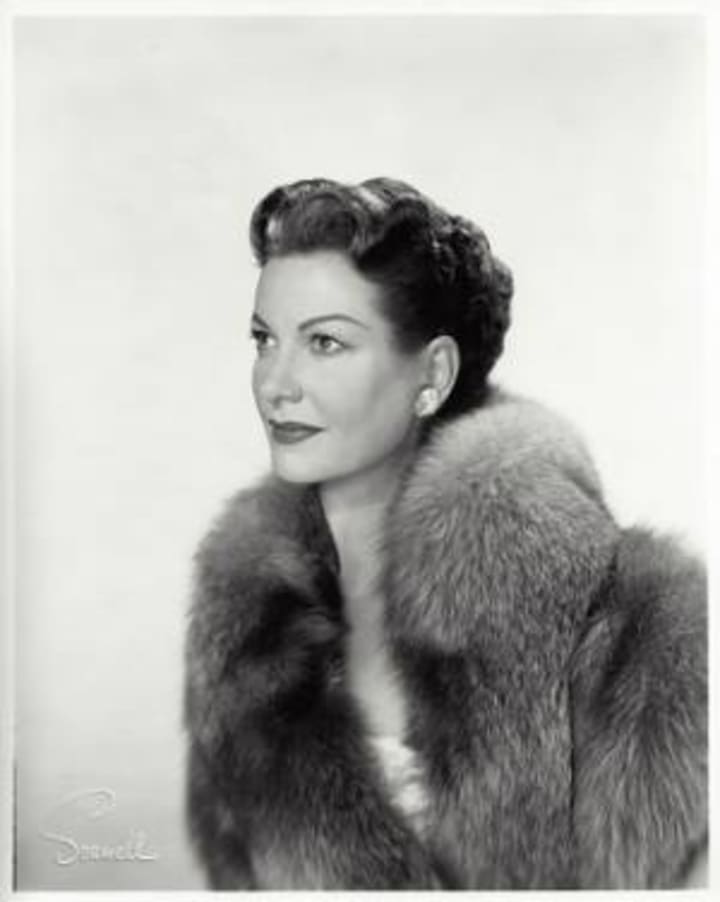
Why would Howard Hughes purchase it from Vera Krupp? How did it ever get on his radar? If the notorious recluse never left his suite at the Desert Inn Hotel the entire time he lived in Las Vegas, as his keepers said was the case, why did he bother to single-out and sell this one property, which was slated for development, at a time when he retained 25,000 acres for that purpose, plus five Strip hotel casinos and an airport, all in the vicinity?
Vera Krupp was married several times, before becoming the wife of her childhood sweetheart, Alfried Krupp von Bohlen und Halbach. A third-generation German arms dealer, Alfried had just spent six years in prison as a World War II war criminal, convicted at the Nuremberg trials of supplying the Nazi regime. The common story is that Vera came to the US when she became estranged from her husband, divorcing him in 1956, and that he could not come to the US to contest the divorce, because his war criminal status had prevented him from doing so.
The reality is murkier. Vera married Krupp in 1952, immediately after he was released from prison. But she had become a naturalized US citizen back in 1947, around the time Alfried had first been imprisoned. He is said to have bought the Ranch for her as a hobby in 1954. But she left Krupp within a year of their marriage, and moved into the Ranch, supposedly out of reach of Alfried.
The fact is Alfried Krupp was pardoned by the US High Commissioner of Germany in 1951, and his properties restored to him, worth north of $45 million. The American pardon was the only reason he was released from prison to begin with. There was apparently nothing preventing him from traveling to the US in 1956. The divorce suit filed by Vera may shed a clearer light on what actually happened. She cited Krupp's unwillingness to have marital relations, refusal to allow her a home life, and pressure he exerted on her to dump her US citizenship. All of this within a year of their nuptials.

Alfried's grandfather, Friedrich Alfred Krupp, committed suicide in 1902, after he was outed as the host of gay orgies in Capri, Italy. Homosexuality was a serious crime in Germany then, punishable by years of hard labor. When the Italian government also started investigating that scandal, the elder Krupp stopped the presses himself, with drastic action. The suicide led to Alfried's mother Bertha Krupp, inheriting the arms business.
Some have derived similar insinuation from the divorce filing by Vera. The absence of an appearance by Alfried in response to Vera's filing may be further indication. Perhaps he did not want to defend her insinuation in open court. Vera's allegations in the divorce seem to have been a shot across the bow, one which Alfried could not afford to ignore. Instead, he had paid her a hefty settlement, let her go, and kept it quiet.
Of all who occupied Spring Mountain Ranch since it's luxurious main house was constructed, Vera Krupp spent the most time there. Much more than just an escape, the Ranch was her primary residence, and home as well to her cattle business. She lived there full time, as did many of her workers. At the Ranch she had broken free from dependence on her husband, and to some degree the stigma of his name. She had become a respected rancher. Soon she was known as a woman able to camp with ranch hands in the wilderness, then wear diamonds to the Governor's ball, establishing the dichotomy of an archetypal Nevada woman, which carries on today. For fifteen years she enjoyed the sunrise reflecting off the sandstone cliffs, just outside her bedroom patio. She survived being a single female ranch owner. She survived armed robbers. She lived life on her terms and loved the magical home she had created.
Unbeknownst to the public, Vera Krupp became chronically ill in 1967, and knew she must leave the ranch permanently for adequate medical care in Los Angeles. With sale imminent, she knew of the sharks circling her home. Their kind still visit the place occasionally, today. These types taste the clean air, experience the feeling of the ranch cradled in its high valley, up against the massive cliffs. They see the wild animals and the taste the pure water, and they all have the same response: Break it up, and and sell it off.
Smarmy developers salivated as they imagined the brochures they would distribute selling condominiums. The backslapping was already underway as Krupp began to plan her exit. She had to know the likely outcome would be similar to that of another dynastic family of great fortune, when the Scripps Ranch near San Diego had been razed, in order to build tracts of two-car garages and garbage compactors. Desperate to know her home would not fall into the hands of such parasites, Vera worked hard to make a deal to have the State of Nevada buy Spring Mountain Ranch for its Parks Department. But those who would approve such a request saw insufficient concern from a public which then new little of the place. Vera's back was against that cliff, the snakes had her cornered, she knew her time was up. But the Baroness had one more bullet, and she knew her adversaries had forgotten with whom they were dealing. Vera Krupp called on the only other millionaire industrialist in southern Nevada, and cut the price to keep the leeches out of her pond.
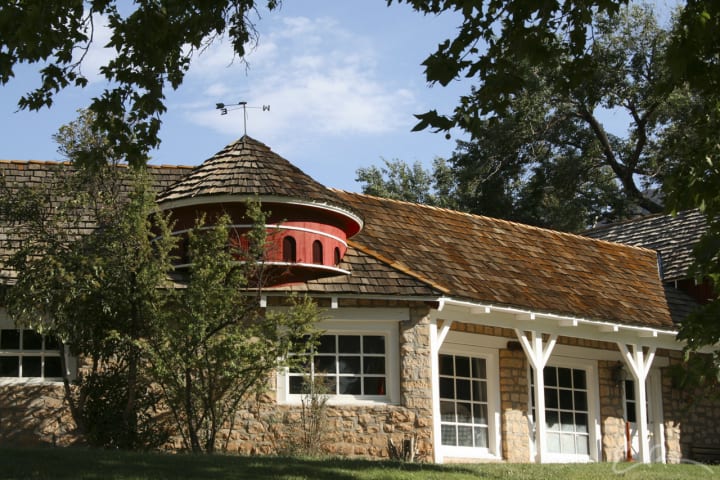
Enter Howard Hughes
Having taken up full-time residence in Las Vegas, Howard Hughes, the public story goes, bought the property as a reclusive place to receive visits from his wife, Jean Peters. The common telling of that history has it that neither of them ever even visited the place.
Actually, neither Howard Hughes directly, nor his Summa Corporation which acquired so many properties in the area, purchased Spring Mountain Ranch. The buyer was a different entity, used for projects held closer to Howard's vest, Hughes Tool Company. Originally a Texas firm, it was was by this time based in Los Angeles.
So were the international defense attorneys, incidentally, of Alfried and Vera Krupp.
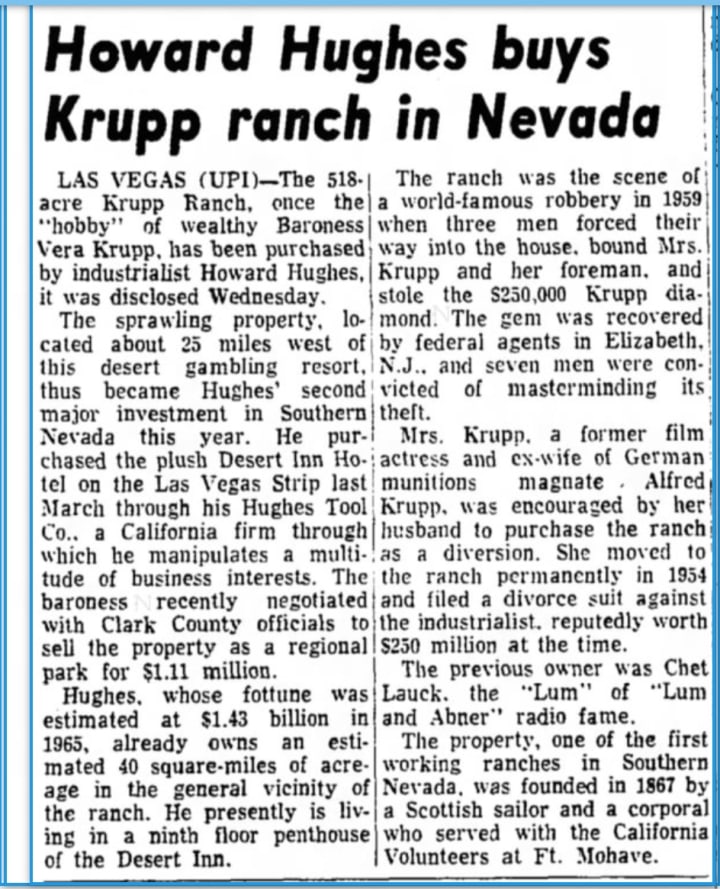
Though Hughes is well known to have begun buying up major properties in Las Vegas in 1967, the reality is that he began frequenting the desert town much earlier. He leased a home in Vegas, just off the Strip, and at the same time he released the film The Las Vegas Story, starring Jane Russell and Victor Mature, in 1952. That's also the year Krupp is said to have set sights on Spring Mountain Ranch. Closer to the Ranch than it was to Las Vegas at the time, a 25,000 acre contiguous parcel Hughes called "Husite," comprising most of the west end of the Las Vegas valley, was also acquired by the billionaire that year. This massive raw land grab, far under market value, received favorable treatment as it was meant to become home to the billionaire's government contractor business, providing munitions to the American war machine. When that didn't pan out, he proposed it for his Super Sonic Transport (SST) airport, which seemed to fall in concert with the legendary pilot's state of mental health.
Recommended Library:
The Husite later took on his mother's maiden name, Summerlin (enter the developers). But even these 1952 Hughes purchases were years after the earliest regular sightings of the billionaire in Las Vegas. Those began over two decades ahead of his taking up residency at the Desert Inn Hotel.
Pioneering Las Vegas entertainer Liberace told Andy Warhol in 1984:
"The first time I played there was in 1944. At that time I did my own rehearsal. I was also the conductor. I gave the light cues. I did everything because I didn’t have the people. So I started my rehearsal with the orchestra and I see this guy in sneakers sitting by the light booth, which was very makeshift. You had to climb up a little ladder to this platform right in the room. So I walked up to this fellow and asked if he was the light man, and he said yes. So I started giving him my light cues. “When I do 'Clair de lune’ give a nice blue wash,” you know. So he’s writing it all down. And (Entertainment Manager) Maxine came in and said, “Oh, have you met Howard Hughes?
"Every time he saw me after that he said, 'How are the lights?' He was visible in those days. But talk about dressing down. You never would suspect that he was anybody. He wore sneakers and sport shirts. But he would walk around. He was very visible. It wasn’t until later that he became a recluse." - Interview Magazine, 1984
Despite the common narrative of Hughes remaining locked up at the Desert Inn, for his entire four years residing there from 1966 to 1970, there are multiple accounts of his having ventured out, on several occasions. Friends of his wife, Hollywood actress Jean Peters, reported in 1969 that Peters said she met Howard at the Ranch on a few occasions, but she had felt too removed from society to enjoy it for more than a few days.
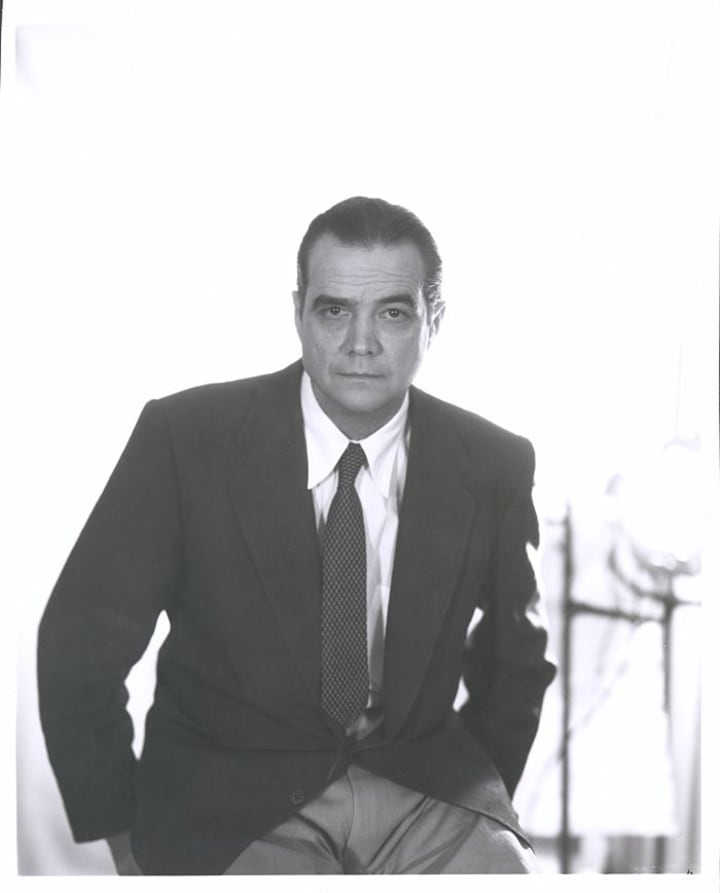
By the time Hughes put Spring Mountain Ranch up for sale, Jean Peters had divorced him, and he had secretly left Las Vegas. Retaining his other land holdings in the area, he sold the Ranch to local car dealer Fletcher Jones, Sr. and partners, who said they intended to build condos on the site - exactly what Vera Krupp had wanted to avoid. That's when my mother and sprung into action.
Liz von Till Warren had just come off the success of saving the Old Mormon Fort in Las Vegas, but had also known preservation disasters, including the destruction of Scripps Ranch, another place I played with my siblings, as an even younger child. In 1973, Public opinion agreed with my mother at Spring Mountain Ranch. Where the State refused to buy from Vera Krupp five years earlier, they now paid twice her price. I recall in those days, mom was often with her friend, County Commissioner Thalia Dondero.
"With a knowing smile, Dondero spoke of how she and other environmentalists finagled the state to buy the Spring Mountain Ranch and make it a state park. State Sen. Floyd Lamb, head of the state Senate Finance Committee, nixed it, saying the state couldn’t afford the cost.
'We named a park after him, and the money was found,' [Dondero] said.
Tule Springs is now named Floyd Lamb Park at Tule Springs, despite Lamb’s federal conviction." - Las Vegas Review Journal, 2009
My mother was then recruited to interpret the history and develop the narrative of Spring Mountain Ranch. On one of the fields, she created the Super Summer Theater with perhaps a wink to the identical acronym originally used to identify the Husite project. I was at the first production, Hamlet, in 1975.
I continued to enjoy the Ranch like it was my own for years. By the time I turned 18, I had hiked and camped on and around most of the surrounding peaks as well.
Elizabeth von Till Warren on saving Spring Mountain Ranch and creating Super Summer Theater, 2013
Vera Krupp had wanted this place preserved. She was determined to keep it from developers' hands. She did so because she was telling us something. She had a message, and that message is that this place should be for the public to enjoy, that it is too wonderfully unique to break up and sell off, or to keep to oneself. She knew greatness there, and wanted us all to feel it too. Her determination moved Elizabeth von till Warren and others to action, and to the success Vera had found unattainable earlier. Thus this project was perhaps the preservation not only of the Ranch, but of an altruistic promise the dying Baroness made to herself.
Quickly becoming a jewel in the crown of the Nevada State Parks system, Spring Mountain Ranch has now enjoyed that status longer than it was ever a home to anyone else. A visit there is a tour de force of successful historic preservation. This was further solidified when in 1990, Elizabeth's friend and ally Congressman Jim Bilbray proposed Bill H.R. 4559, which was signed into law by President George H.W. Bush, establishing the 200,000 acres surrounding Spring Mountain Ranch as Red Rock Canyon National Conservation Area. The destination now sees over two million visitors annually.
Elizabeth von Till Warren, interviewed by Jonathan Warren at Spring Mountain Ranch, 2018.
When I return, as I often do, to Spring Mountain Ranch, I remain in awe of these two women who fought for this institution of Las Vegas area culture, and the fact that I was so fortunate to experience that history. It always takes me back to a cool spring morning in 1974, flying over the desert at dawn, riding shotgun in Mom's bronco. And I know that the many who now trek Spring Mountain Ranch walk with Vera, and with Liz.
Recommended Library:
More on the work of the Warrens in Las Vegas:
More on Howard Hughes in Las Vegas:
More on Red Rock Canyon's secrets:
About the Creator
Jonathan Warren
Honorary Consul of Monaco, Chairman of the Liberace Foundation for the Performing and Creative Arts, 50 years in Vegas, Citizen of the world.
www.jonathanwarren.me


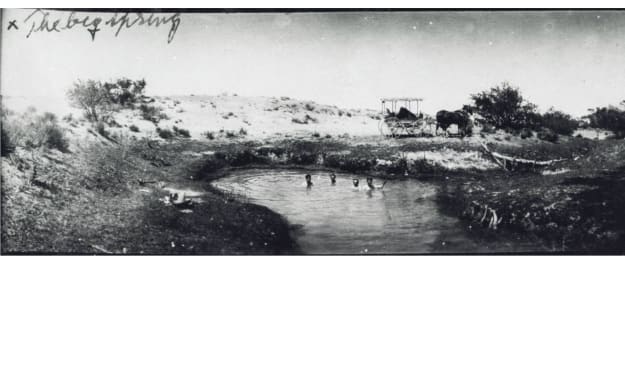



Comments
There are no comments for this story
Be the first to respond and start the conversation.